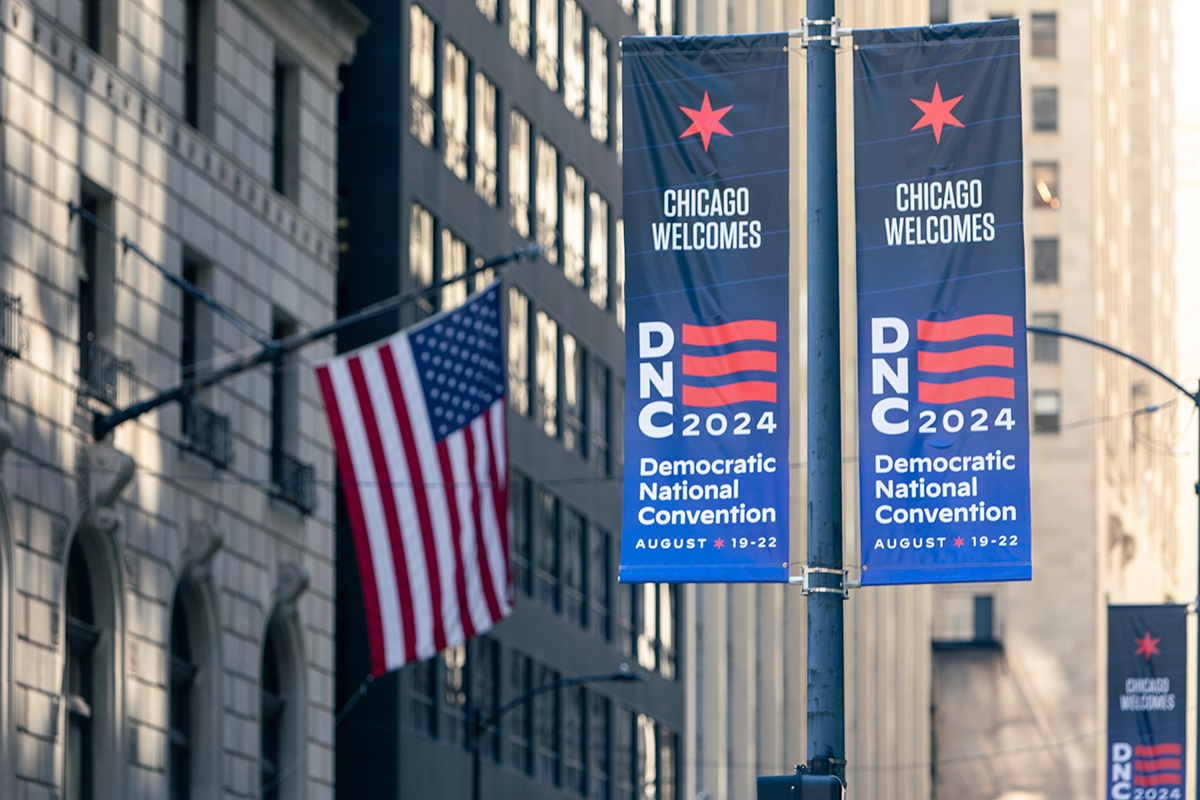 The Democratic National Convention will take place in Chicago from Aug. 19-22, 2024. (Photo by Keeton Holder)
The Democratic National Convention will take place in Chicago from Aug. 19-22, 2024. (Photo by Keeton Holder)It will be hard to miss the Democratic National Convention next week in Chicago. With city officials anticipating approximately 50,000 delegates, members of the media and other organizers to visit during the convention, Chicagoans can expect a boost in traffic and crowds throughout the city.
While crowded public transportation, booked out restaurants and alternate driving routes are a summer staple in Chicago, Juan Mendez, a senior instructor in the School of Hospitality and Sports Business, notes the economic impact of large-scale events such as the DNC is nothing to complain about.
“Experts estimate this convention will bring in $250 million to Chicago,” Mendez notes. “For reference, Lollapalooza brings in about $400 million each summer. So, the event is huge and that’s why cities compete and bid to host these conventions. In addition to that convention week, events like these are amazing for ‘selling the city’ and showing potential visitors what Chicago has to offer. The impact lasts long after the convention ends.”
Most of the convention’s programming will take place at the United Center and McCormick Place, well-known venues in Chicago’s hospitality industry. However, organizers of the DNC have worked to build equity throughout the Chicago community this year.
“The DNC has been purposeful in its planning for 2024, utilizing diverse vendors and incorporating as many Chicago neighborhoods as possible. This includes small businesses that likely have not had the opportunity to participate in an event like this before,” Mendez says. “Organizers have made it a point to ensure Chicago residents can engage with the event, ultimately elevating the local community. The event will highlight Chicago’s cultural diversity and the economic opportunities here, as well as the values the DNC stands for as an organization.”
While this is not the first time the Democrats have chosen Chicago to host its convention — the city has played host to the Democrats 11 times previously — experts believe political strategy played a large role in this year’s location choice. A critical point in the campaign journey, the convention has typically been the first time the general electorate begins paying attention to the election and provides a major marketing platform for nominated political candidates.
“Organizers likely chose Chicago to build on the goodwill of former President Barack Obama and as a way to energize Black and Latino voters, two important bases for the Democrats,” says Bruce Newman, a Wicklander Fellow in Business Ethics in the Driehaus College of Business and an expert in political marketing. “These conventions also serve to enlist the folks who are loyal to the party — those ready to knock on doors, fold flyers or even hop on social media. Campaigning really ramps up after the DNC because to win you need the help of people who want to show up and support you.”
As a case study on political marketing, Newman notes there is no better example than an event like the DNC.
“As a strategic move, the chosen location for an event like this plays into market segmentation and how you reach specific areas of voters. It hits on positioning and how an organization emphasizes its competitive edge over the competitor,” Newman says. “As someone who has been to a large convention before — the DNC in Chicago in 1996 — it is truly a spectacle. It’s exciting. It’s an opportunity to see history happening right outside our door.”